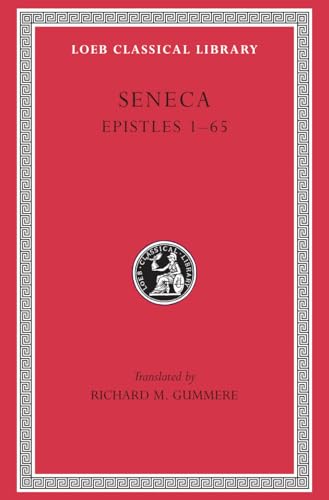Seneca, Volume IV, Epistles 1-65 (Loeb Classical Library No. 75)
Seneca
BOOK REVIEW

Seneca, Volume IV, Epistles 1-65 transcends time, drawing us into the profound, lucent world of Stoic philosophy. Written by the monumental figure Lucius Annaeus Seneca, this collection of epistles offers a window into the mind of a man who navigated the turbulent waters of politics and personal struggle in ancient Rome. These letters resonate with the eternal human experience, compelling you to confront your own beliefs and behaviors.
From the very first page of this collection, Seneca commands your attention. His words are not just ink on paper; they are a call to arms for your spirit. He delves into themes of virtue, knowledge, and the essence of happiness, coaxing you to unravel the tumultuous emotions that often cloud your judgment. This isn't mere philosophy; it's a life raft thrown into the stormy sea of existence. You can feel the weight of despair lifting, a flicker of resilience igniting within you as you navigate the dense prose, which is both elegantly poetic and piercingly direct.
Imagine, for a moment, being a Roman citizen during Seneca's time-distrust and political machinations lurking in every shadow. Here, Seneca finds himself at the crux of power and morality, advocating for a life aligned not with the whims of fortune but with the unwavering acceptance of fate. His insights are universal, often chilling in their clarity. "We suffer more often in imagination than in reality," he writes, prompting a gut-wrenching reflection on how our fears are often mere illusions.
Many readers share their struggles with the complexity of Seneca's thoughts. Renowned for his sharp wit and astute observations, critiques often surface-some argue that his elite status as a statesman distancing him from the common man's struggles diminishes the relatability of his wisdom. Others assert that this very status enriches his perspective, imbuing his advice with layers of practical wisdom, honed through personal turmoil and hardship.
These letters encapsulate not only personal instruction but serve as a timeless repository of self-help. You will find yourself captivated by Seneca's discussions on anger, grief, and the nature of true friendship. The raw honesty of his pen will provoke an emotional upheaval-a confrontation with your own vices and virtues. "He who is brave is free," he asserts, daring you to embrace courage in a world rife with cowardice.
Rapidly, you may discover that this ancient text has influenced a myriad of historical figures across the ages-from Renaissance thinkers to existentialists such as Sartre and Nietzsche. Each of these intellectual giants drew insights from Seneca, intertwining his Stoic teachings with their own philosophies, illuminating paths for generations. You'll be left pondering: what profound shifts in modernity might yet arise from revisiting his timeless wisdom?
The collection is not simply an academic exercise; it is a mirror reflecting our modern dilemmas back at us. In a society plagued by the frenetic pace of life, where distractions abound and meaning often seems elusive, Seneca invites you to pause. The rhythmic cadence of his writing lulls you into a contemplative state, offering a different lens through which to view your own tribulations.
As your journey unfolds with these epistles, a tapestry of emotions-joy, sorrow, anger-intertwines with the philosophy of life itself. The letters intimate a kind of intimacy, as if Seneca speaks directly to you, revealing secrets that have the power to transform not only your thoughts but your entire existence.
Engagements of this sort do not simply end; they deeply imprint on your psyche. After reading Seneca, Volume IV, Epistles 1-65, you may feel a new sense of ownership over your emotional landscape, a recognition that there is both honor and strength in vulnerability.
This text is an embrace from the past, urging you to undertake the noblest of quests-the quest for self-knowledge. It's about diving headfirst into the realm of your own consciousness and emerging, not unscathed, but truly reborn. Don't be surprised if the words linger long after the last page: they compel you not just to read, but to live with intention, dignity, and an embrace of the complexities of being human.
📖 Seneca, Volume IV, Epistles 1-65 (Loeb Classical Library No. 75)
✍ by Seneca
🧾 496 pages
1916
#seneca #volume #epistles #loeb #classical #library #seneca #Seneca